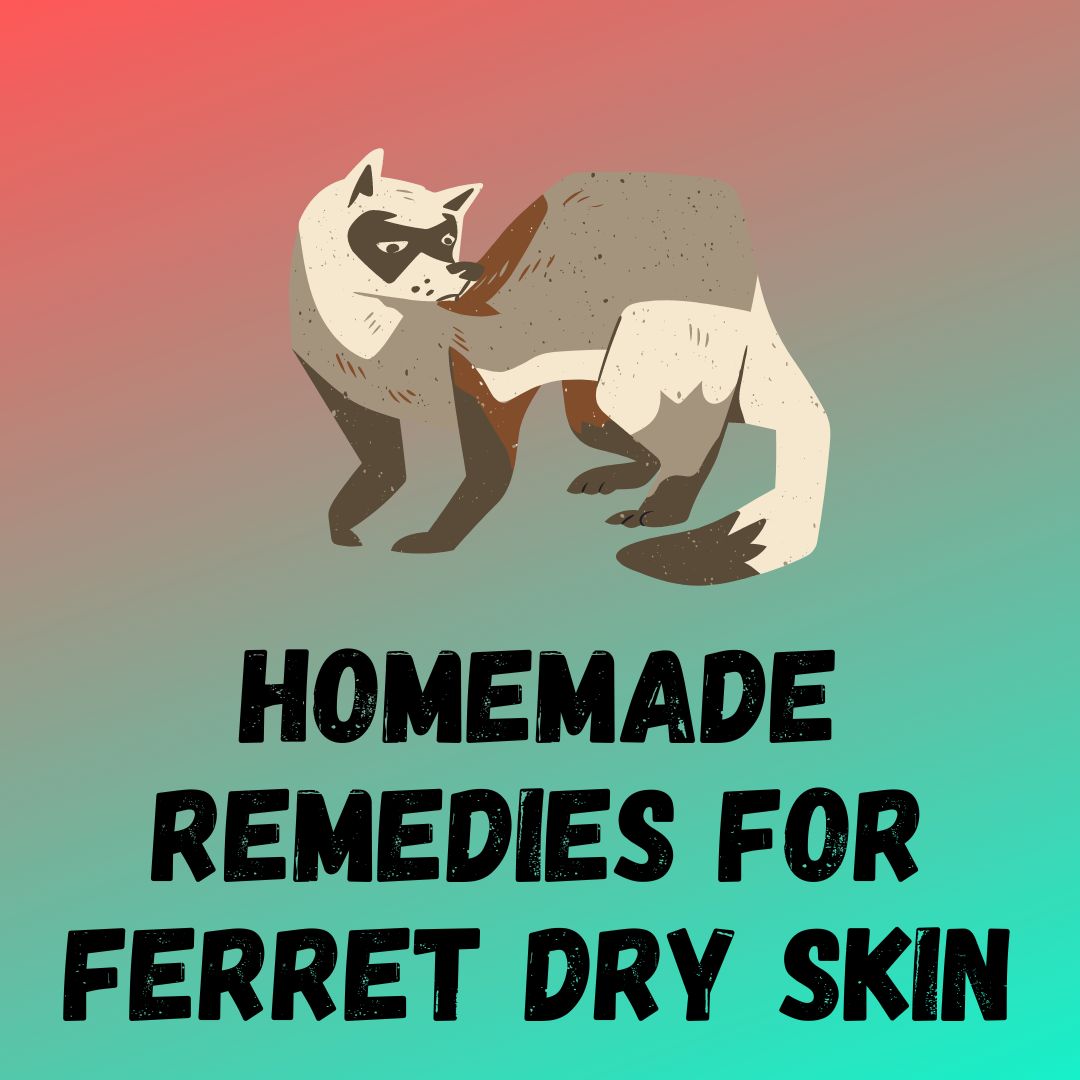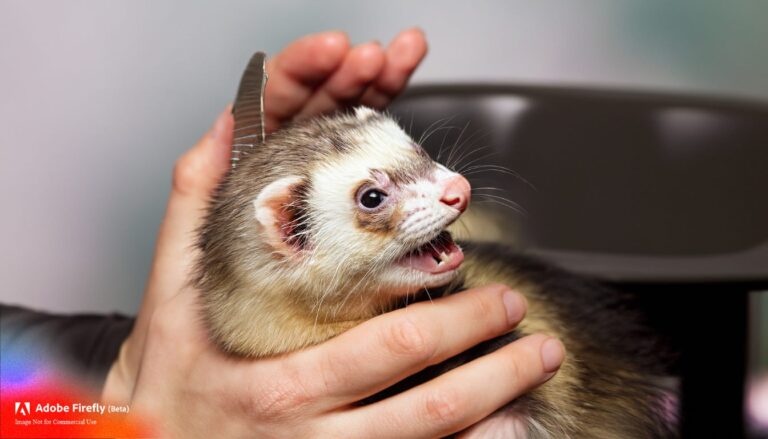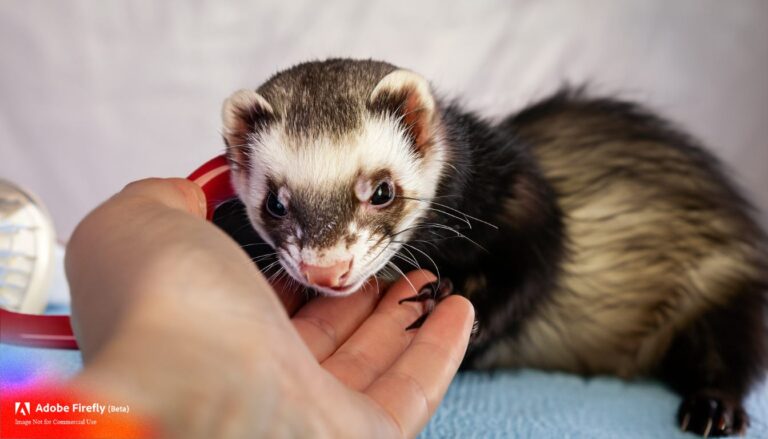
If your ferret is suffering from dry skin, it is concerning for your pet and you. Being a responsible owner, you should pay attention to the bathing frequency and the diet you’re feeding your pet. You are in the right place if you want to know home remedies for ferret dry skin.
In this article, we will discuss five home remedies for ferret dry skin backed by studies from reputable sources. Before I tell you what you can do about your ferret lacking moisture and oil, leading to dry & itchy skin, here is what you need to do about causes to prevent dry skin recurrence.
3 Reasons Why Is My Ferret Skin So Dry?
Winter Season
First, ferret skin is more likely to dry during the winter when they shed to renew their code to tackle a severe cold. Like any other pet, ferrets will likely shed coats, especially if you live in a colder region.
Poor Diet
A common cause of dry skin is that it is very itchy & scaly and tends to be a poor diet. Pay attention to what you are feeding and your pets’ nutrition needs. As the pet kare clinic told us, if you have been feeding a diet that contains less fat than your pets require, it can lead to dry, brittle coats and itchy skin. According to the veterinary partner, keeping your ferret on a diet that contains at least 15-30% fat but is low in fiber is recommended. Also, their ideal diet should contain at least 35% protein from meat-based food.
Over Bathing
As Animalwised suggests, you should never try to bathe your ferret too much or more than required. It is always best to bathe your ferret only once a month to prevent dry skin. When you bathe your ferret, its natural oil & moisture wash away with water, leading to dry & flaky skin, making your pet susceptible to hair loss & itching. Plus, when bathing your ferret, it is important to avoid using any product on your pet’s coat. If you want to know how to bathe, I recommend always going with homemade ferret shampoo and using homemade ferret deodorizer after the bath.
7 Homemade Remedies For Ferrets Dry Skin
Humidifier
If your ferret suffers from dry skin, you can consider placing a cold humidifier in its room. According to Oxbow Animal Health, keeping ambient humidity at a higher level is recommended to help your ferret’s symptoms of dry skin. According to the Strongsville Animal Hospital, humidity tends to be low in the air during winter.
Therefore, placing a good quality air humidifier in your ferret room, where they spend most of their time, will increase the moisture level in the air. In the winter, if you keep the heat on, the humidity will likely be very low. As Veteran Key said, pets in a dry environment can develop scratchy & flaky skin in no time. Hence, University Animal Clinics recommends installing a good quality humidifier In a heated home to make your pet feel more comfortable, making it less likely to develop a respiratory illness.
Olive Oil
Another great home remedy l for ferret dry skin is olive oil. Olive oil helps treat dry skin in ferrets and clean up wax build-up if you put drops in your pet’s ears. If your ferret has developed dry skin, you need to put some olive oil in your hand and rub it into their skin. However, suppose your ferret skin seems to be very flaky & dry.
In that case, you can also consider preparing a solution of 1/ 2 tsp daily of extra virgin oil and applying 1 /4 tsp fish oil at least 2 to 3 times a week to get your ferret rehydrated properly. Also, you should first consult with a veterinarian regarding the type of fish oil you can use for dry skin in your ferret. Not all type of fish oil is healthy for their skin. The Manitoba Ferret Association suggests olive oil contains exceptional anti-inflammatory properties, and you don’t need to refrigerate it
Oatmeal Bath in Warm Water
Another effective homemade remedy for the ferret’s dry skin is bathing your pet in warm water containing oatmeal. According to the Ferret Rescue Society of Ottawa, you should consider adding some dried oats in a sock and let it soak in the warm water as much as you need to fill the tub used to soak your ferret.
This is helpful for ferret skim, which is itchy and exceptionally dry. Instead of dried oats, you can use 1/3 to 1/2 cups of plain oatmeal. If you don’t have plain oatmeal, Ferret World suggests you consider using rolled oats or quick oats, as it doesn’t matter the oats type as long as it doesn’t contain any additives or preservatives.
When researching the effectiveness of an oatmeal bath for ferret dry skin, I learned about a well-known guide from the pups and polecat suggesting the ferret may receive relief after a bath, but it will be temporary. Even though many owners claim their ferrets find immediate relief & cure for dry skin after a bath, they fail to realize that it’s only temporary. Like any other pet, your ferret body will also need time to react and overproduce that oil to prevent dry skin.
Coconut Oil
One of the other great home remedies for ferret dry skin is also said to be coconut oil. According to Cocotherapy, coconut oil is very helpful in alleviating itching and dry skin in all kinds of small animals. Hence, this statement also suggests using coconut oil for your ferret dry skin. Strongsville Animal Hospital claims that coconut is helpful in treating dry skin in ferrets and making their skin look softer & smoother. In addition, I have also noticed coconut oil is very helpful in preventing tooth decay and promoting good cholesterol levels in ferrets if given in the right amount.
Aloe vera
Even though aloe vera is not very safe for your ferret to ingest, it can be very helpful if used externally. As Aloevera Swiss suggests, you can effectively use aloe vera as an ideal homemade care product for your ferret Coat & skin. Additionally, aloe vera has been associated with natural healing functions and is often recommended for animal skin suffering from irritation, insect bites, superficial wounds, rashes, and eczema.
Additionally, aloe vera is safe to use moisturizer on your ferret skin and is extremely useful for sensitive and damaged furs. Alternatively, you can also consider using aloe vera when bathing them to eliminate musty odor. But, you might have to adjust your pet’s regular grooming routine & habits, such as occasional baths are recommended.
Chamomile Tea Rinse
If all the above has already been tried & tested on your pet, and your ferret doesn’t seem to be recovering from dry skin, you can also consider using chamomile tea rinse. You need to brew a cup of chamomile tea and let it cool down. Chamomile tea rinse can be used after bathing your ferret as it contains inflammatory properties effective in treating minor skin irritations by killing yeast & bacteria, complicating lesions with their presence.
When it comes to treating dry skin in pet animals, there are varieties of tea you can use to help them. However, chamomile tea rinse is the best for ferrets, as petMD suggests. As per a few experienced owners, chamomile is a great solution when you don’t have emollient skin spray or any other topical creams that you use on your ferret skin and fur to add moisture.
When the air is quite dry, chamomile tea rinse is very effective. However, it shouldn’t be considered an alternative to emollient skin spray, anti-inflammatory medication, or topical creams that your veterinarian recommends applying on your ferret’s skin.
Vitamin E Oil
According to the pet kare Clinic, you can also consider using Vitamin E oil in a small amount on your pet’s pads daily to help them keep soft and remove any excess tissue. It is also an effective solution for dry skin in ferrets. To moisturize and nourish the dry skin, apply a few drops of Vitamin E oil to your ferret skin and gently massage it.
Other than this, you can also consider using any oil your veterinarian recommends or Vaseline temporarily to rub on your ferret pad daily. Vitamin E oil is more helpful in older ferrets whose hairy coat is more likely to be susceptible to becoming dry as well as brittle with age. As your pet ages, you should also avoid bathing your ferrets frequently as it will strip the natural oil and the condition. Per the pet care clinic, you should never bathe your pet more than once a month unless you have medical direction.
Conclusion
All the treatments mentioned above are very helpful in treating dry-skin ferrets. However, it’s best to consult a veterinarian in case of severe itchy & dry skin. Every pet is different, and your ferret may require any certain medication or topical-free cream for the treatment.
Also, you should note that dry skin in ferrets can be a symptom of underlying health issues you might not know right now. Therefore, consulting a veterinarian will help you properly diagnose your ferret’s dry skin and get an effective solution. However, if the dry skin is due to recent bathing, try applying olive oil to provide immediate relief.
I hope I have given all the solutions you need on the Homemade remedies for ferret dry skin. If you find the article helpful, then consider sharing it. Your share will help many people learn about the possible home remedies for ferrets that are sometimes considered way better than medications or topical creams. To stay updated with ferret care & requirements to prevent any health issues in your pet, consider reading my other guides on this website. See you in the next post, till then, take care & goodbye.






